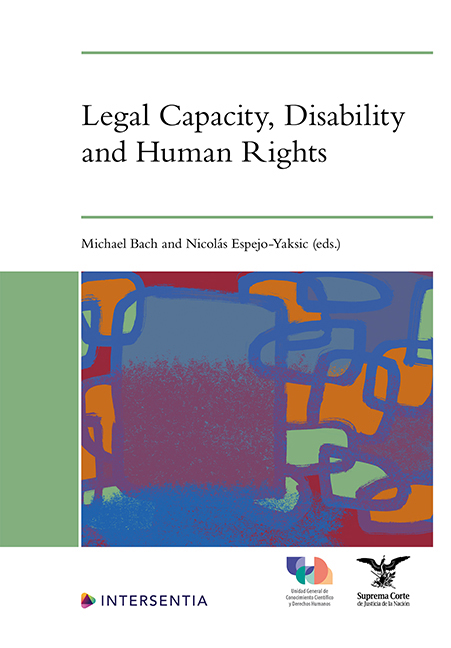Book contents
- Frontmatter
- Foreword
- Acknowledgements
- Contents
- List of Cases
- List of Contributors
- Legal Capacity, Disability and Human Rights: Introduction
- PART I HISTORICAL PERSPECTIVES AND THEORETICAL FRAMES
- PART II LAW REFORM: COUNTRY AND REGIONAL PERSPECTIVES
- PART III LEGAL QUESTIONS, PERSISTENT CHALLENGES
- Index
- About the Editors
A Historical Review of Legal Capacity
Published online by Cambridge University Press: 03 April 2024
- Frontmatter
- Foreword
- Acknowledgements
- Contents
- List of Cases
- List of Contributors
- Legal Capacity, Disability and Human Rights: Introduction
- PART I HISTORICAL PERSPECTIVES AND THEORETICAL FRAMES
- PART II LAW REFORM: COUNTRY AND REGIONAL PERSPECTIVES
- PART III LEGAL QUESTIONS, PERSISTENT CHALLENGES
- Index
- About the Editors
Summary
STATUS AS A KEY TO THE CULTURE OF IUS COMMUNE: with OUT STATUS, THERE IS NO PERSON
The legal culture of ius commune – medieval Roman law developed into a system of rules that formed a universal common law for Western Europe – built and deployed its categories and discourses on the reading and re-reading of various passages of the Corpus Iuris Civilis, which included the Digest, the Code and the Institutions. Jurists from the 12th century onwards found in the Corpus that the words “status”, “persona”, and “homo” were used in very varied contexts, especially in Title I of the Digest and two titles of the Institutions .
In Title I of Book I of the Digest and the first of the Institutions, specific passages from the Institutions of Gaius were, to a greater or lesser extent, reproduced; these may be regarded as a decisive point of reference for the construction of a discipline of the person, before codifications in law were developed. A triple division of personal law – de jure personarum – resulted from these texts, i.e., the summa divisio: liberi aut servi, followed by a second division, sui iuris or alieni iuris, and finally quae in tutela, quae in curatela or ceteras personas, quae neutro iure tenentur. In the culture of ius commune, these passages were read, in general, with a tendency to highlight the divisions they consecrated between the people, rather than a division of the law of the people. This interpretation consolidated a central idea in that culture: the “division” of people so that a perspective was imposed that highlighted plurality.
The second title of the Institutions refers to the capitis deminutio, conceived as prioris status commutatio, a change that could happen in three different ways – tribus modis accidit. These ways enabled jurists to establish, from very early on, the basic idea according to which there were three statuses of persons: civitatis, libertatis, familiae. This was not a trilogy typical of Roman jurisprudence, but it was articulated by ius commune jurists, and enjoyed singular fortune; so much so that the exposition of the right of persons conformed to this trilogy.
- Type
- Chapter
- Information
- Legal Capacity, Disability and Human Rights , pp. 15 - 30Publisher: IntersentiaPrint publication year: 2023



